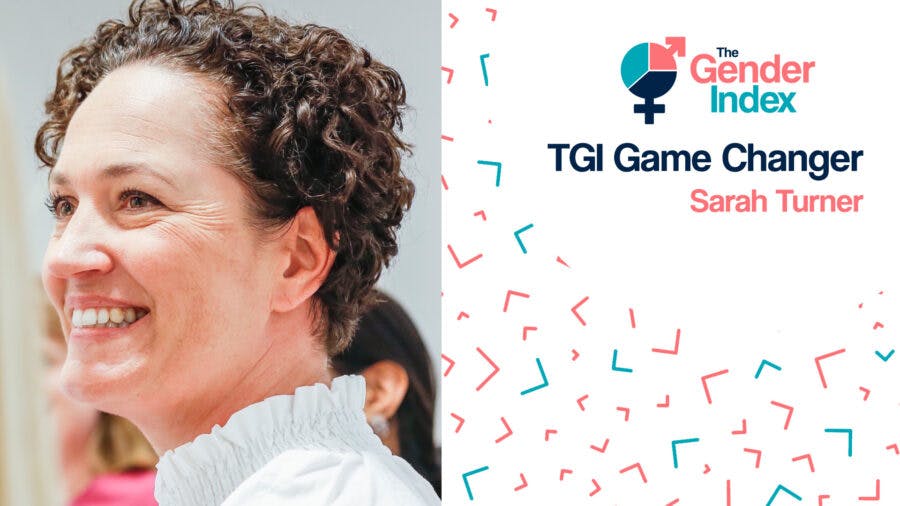We use cookies to effortlessly improve your experience on our site. Cookies also help us understand how our site is being used, so that we can keep making it better. You can read more about it in our cookie policy and change your settings here at any time.
“Bootstrap your business as long as you can, prove a need for your product, and that you can build, to get better terms with investors”

Our TGI game changer community continues to expand, as we welcome insights from incredible thought leaders in the world of female entrepreneurship.
Next up is Sarah Turner, founder and CEO of Angel Academe, an angel network mobilising more women as angel investors and deploying their capital into female founded tech startups.
Sarah is an angel investor herself and provides invaluable advice for female founders looking at this route.
Can you give us a brief overview of Angel Academe and how you support investors and founders?
Angel Academe started eight years ago. I’d begun angel investing, and I rarely met another female investor at pitches and networking events. It was – literally- a sea of men!
I felt women were missing out on being an investor. It’s stimulating and empowering and actually good fun. I also felt entrepreneurs were also missing out on what women could bring.
It was also evident that women were not securing investment at the same rate as men. When female entrepreneurs were faced with a largely male group, they never quite got the same response as the men. Often it was (wrongly!) cited that they lacked confidence or ambition. This drove me crazy as it did not tally with my experience of working with female founders! It usually comes down to a different style of communication. Women are often not as comfortable telling these improbable stories of hyper growth. But when you look closely at their businesses, they’re often doing better than the ones with male founders.
So, that’s how Angel Academe came about. As a business we invest in female-founded start-ups and introduce more women to angel investing.
What are the main differences between angel investing and other types of funding, such as VC?
Venture capital describes all the money invested in high growth potential companies, and within that we have various categories. Private equity tends to invest much later on, in businesses that are quite large, stable and generating profits.
Then there are VC firms; companies investing money they’ve raised from other sources. They often have access to huge funds and tend to get involved at earlier stages than private equity and when a company is starting to show signs of explosive growth. Typically they invest at Series A and seek huge returns on their investment.
Angel investment is at an even earlier stage, often pre-revenue. Angel investors want to see financial return, but they don’t necessarily want or need to invest in billion dollar businesses. It’s their own money and it’s more personal. There’s also crowdfunding, which is a cheap and easy way to get started with investing and often a good option for consumer-oriented startups.
What are the benefits of this type of investment for female founders?
Angels are usually investing earlier, often because they like the sector, or they can add some value, or they like the people behind it, or it’s an innovation they want to see in the world. So, there’s usually more of a personal connection.
Angels will meet with founders and team members, get to know them and understand what makes them tick. It doesn’t mean they want to run their businesses, they’re investing in the founders to do that. But there is often more regular contact and a closer value-added relationship. This makes this type of investment ideal for high growth potential start-ups.
As you’re an angel investor, what types of companies have you invested in?
All my recent investments have been through Angel Academe. Typically we are investing in technology or science based businesses. Angels often favour companies that are working in an area they understand, so they can add value. They may have a particular expertise that gives them an edge. I have invested in a lot of enterprise software companies, and our best performing investment is in the HR space.
What are your top five tips for female founders looking for investment?
Bootstrap your business for as long as possible! Prove there’s a need for your product or service and that you can build a company. You will get much better terms with investors. Many investors will expect to see some revenue, but even if you’re still in the research and development stage and not yet making (much) money, you can prove your ability to execute in other ways. There are other milestones that we can look at in lieu of revenue such as grants, trials and letters of intent.
The second tip is to know why you want investment. Is it the right growth path for your business? You are selling part of your business, so you’ll have to report to those investors on how it’s performing and they will be expecting you to grow quickly and within a certain period of time. There are other funding options if you prefer to grow more slowly.
The third one is to think like an investor. What’s in it for them? What are they looking for? They need to see you know the market and can convince them you are the right people to capture that market and beat your competition. So educate yourself as much as possible on what investors are looking for. Join pitch events and hear the questions investors ask.
Do your research, there are infinite resources on the web. Most funds and groups have a sector focus, or a stage focus or a way they’d like you to get in touch. Try to avoid spamming.
How do you think The Gender Index can support the growth of female entrepreneurship?
It’s vitally important for us to understand what’s happening and its value. There is a success story on our hands, because the number of female-founded businesses has gone up exponentially. That’s not to say there aren’t still challenges.
I think we need to educate people on the different types of funding and definitely do more to promote angel investing. We need to use the platform for a bigger discussion and raise awareness among women. I hope the data can help us do that. We need to be talking to the right people to stimulate and grow entrepreneurship.
I’m not convinced it is policy makers, I think it’s more about the founders and potential founders.

